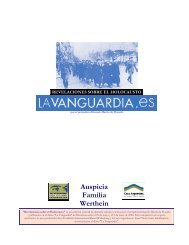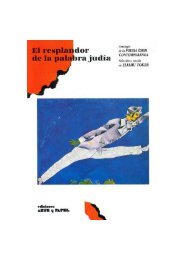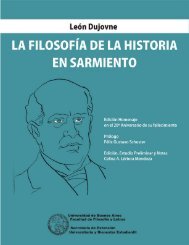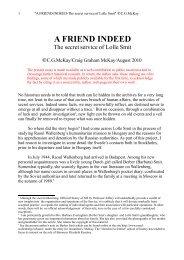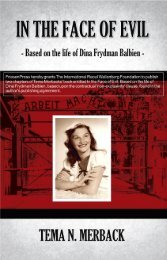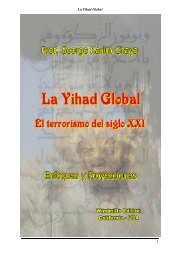We were There - The International Raoul Wallenberg Foundation
We were There - The International Raoul Wallenberg Foundation
We were There - The International Raoul Wallenberg Foundation
You also want an ePaper? Increase the reach of your titles
YUMPU automatically turns print PDFs into web optimized ePapers that Google loves.
László Baky (1898-1946) was a gendarme-officer and a politician. He retired from his office in 1938 in<br />
order to become a politician, and in 1939 he became a member of the Hungarian Parliament. He founded<br />
the Hungarian National Socialist Party together with Fidél Pálffy and Jenő Ruszkay in 1941. During the<br />
Sztójay Cabinet in 1944 he was Undersecretary of State for Internal Affairs, and as such he was in charge<br />
of the police and the gendarmerie. He was directly responsible for the deportation of the Hungarian Jews.<br />
After the Arrow Cross coup d'état, he was the director of the National Security Office (an office without<br />
any political power). He was charged with crimes against humanity and executed in 1946.<br />
László Bárdossy (1890-1946) was the Minister for Foreign Affairs between February 14, 1941, and<br />
March 7, 1942 and Prime Minister between April 3, 1941, and March 7, 1942. Hungary entered the war<br />
against Yugoslavia and the Soviet Union under his ministry. In autumn 1944 he became one of the leaders<br />
of the extreme right League of Members of Parliament. After WWII he was found guilty of war crimes and<br />
executed.<br />
Géza Bornemissza (1895-1983) was a mechanical engineer and a politician. He was minister several<br />
times between 1935 and 1944.<br />
Sándor Csia (1894-1946) was a politician. He was associated with Ferenc Szálasi. Beginning in 1939, he<br />
was the representative of the Arrow Cross Party in the Hungarian Parliament. After the war he was<br />
sentenced to death.<br />
Carl Ivan Danielsson (1880–1963) was the Swedish Ambassador to Hungary from 1944–1945.<br />
Danielsson refused to leave his post when Miklós Horthy was overruled. Instead, he supported and<br />
participated in the rescue operation lead by <strong>Raoul</strong> <strong>Wallenberg</strong>. He signed Schutz-Passes, personally raising<br />
their protection value, and looked the other way when the permitted quota was exceeded or his<br />
signature was forged. He was responsible for the rescue and protection of tens of thousands of Hungarian<br />
Jews.<br />
Kálmán Darányi (1886-1939) was the Minister for Agriculture from 1935 to 1936, and Prime Minister<br />
between October 10, 1936, and May 14, 1938. <strong>The</strong> first anti-Jewish law in Hungary was introduced by his<br />
government.<br />
Adolf Eichmann (1906-1962) was a German Lieutenant Coronel for the SS and a major organizer of the<br />
Holocaust. Eichmann was in charge of logistics of the mass deportation of Jews to the death camps<br />
throughout Europe. He was especially involved in the Hungarian deportations that he began in 1944. After<br />
the war, Eichmann escaped to Argentina, where he was eventually apprehended by Israeli undercover<br />
agents and taken to Israel to stand trial. He was convicted of crimes against humanity and war crimes and<br />
executed in 1962.<br />
László Endre (1895-1946) was a politician known for anti-Semitism and supporter of the extreme right.<br />
He was the deputy-lieutenant of Pest County from 1938 to 1944. From April 1944 he was an<br />
Undersecretary of State for Internal Affairs, and was largely responsible for the deportation of the<br />
Hungarian Jews. He was sentenced to death and executed after the war.<br />
Gyula Gömbös (1886-1936) was an officer in the Hungarian army and a Prime Minister from 1932 to<br />
1936. He re-organized the governing party and tried to introduce a fascist regime in Hungary.<br />
45





